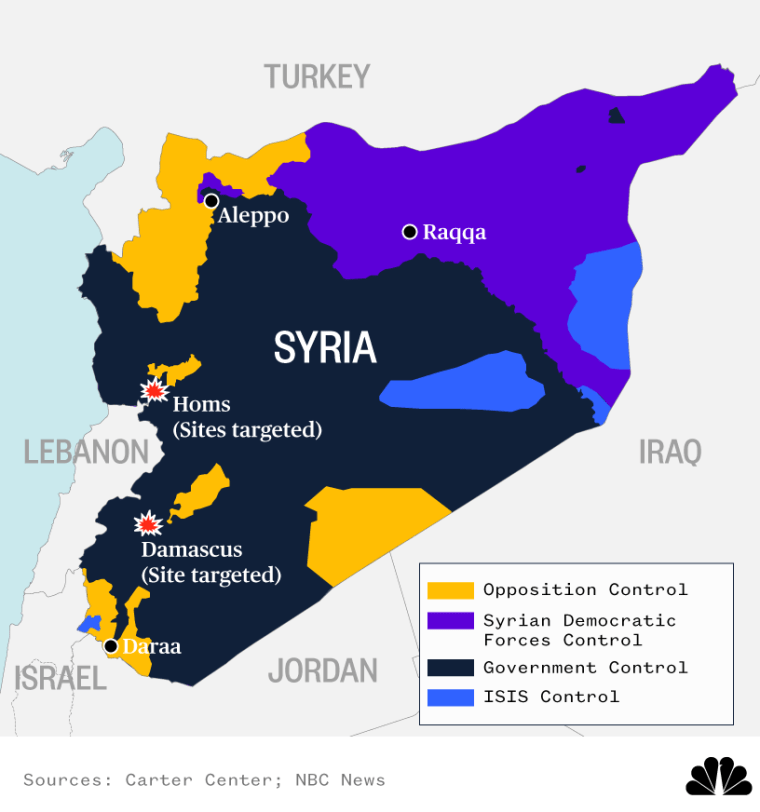President Donald Trump declared "mission accomplished" early Saturday after the U.S.-led predawn airstrikes in Syria dealt what Pentagon officials called a "very serious blow" at "the heart of the Syrian chemical weapons program."
While Syrian television reported that the nation's air defenses had responded to the strikes, "none of our aircraft or missiles in this operation were successfully engaged" by the regime of President Bashar al-Assad, said Lt. Gen. Kenneth McKenzie, the director of the Joint Chiefs of Staff.
"The Syrian response was remarkably ineffective," he told reporters Saturday morning.
The airstrikes included 105 weapons that were deployed against three targets in Syria in a multinational effort that involved France and the United Kingdom and were in response to a suspected chemical attack last weekend that killed dozens.
Pentagon officials said the missiles struck at 4 a.m. local time Saturday (9 p.m. ET Friday).
At a news conference at the Pentagon after Trump announced the strikes Friday night, Defense Secretary James Mattis described the strikes as "a little over double the weapons" used by the Trump administration to carry out a similar attack in April 2017 that consisted of 59 Tomahawk cruise missiles.
“Last year the focus was on the delivery," Pentagon spokeswoman Dana White said Saturday. "This time the strikes went to the very heart of the enterprise, to the research, to development, to storage. We are very confident that we have significantly crippled Assad’s ability to deploy these weapons.”
She added that the mission in Syria remains defeating the Islamic State, but that the U.S. will not allow Assad to attack "innocent Syrian people."

Both Russia and Iran condemned the airstrikes, with Russian military officials claiming Saturday that the Syrian military had shot down more than 70 missiles.
While the Pentagon acknowledged that the Syrian military fired more than 40 surface-to-air missiles, McKenzie said most of the missiles were launched after the U.S.-led strike.
"No Syrian weapon had any effect on anything that we did," McKenzie said.
White stood by Trump's assessment of "mission accomplished."
"Last night, operations were very successful, we met our objectives, we hit the sites — the heart of the chem weapons program — so it was 'mission accomplished,'" White said.
Trump's tweet Saturday appeared to be referring to the success of the strike, but whether or not the Assad regime will be deterred from using chemical weapons again remains to be seen.
The U.S.-led airstrikes were launched in response to a suspected nerve agent attack on April 7 in the city of Douma in eastern Ghouta that killed dozens of people, including children, local activists have told NBC News. Syria and Russia have denied any involvement in the alleged attack, and Syria has repeatedly denied using chemical weapons.
Russian President Vladimir Putin on Saturday reaffirmed Russia's view that the purported chemical attack was a fake, criticizing the U.S. and its allies for launching the strike without waiting for inspectors from the Organization for the Prohibition of Chemical Weapons, the international watchdog group, to visit the area.
The organization said later Saturday that its fact-finding team would continue a planned deployment to Syria to help establish the facts around the suspected chemical weapons attack in Douma.
"The Russian disinformation campaign has already begun," White said. "There has been a 2,000 percent increase in Russian trolls in the last 24 hours. Therefore we will keep you all abreast of the facts going forward."
This is a breaking news story. Please check back for updates.